Criminal Fiction: August of good fortune
Every month, Daneet Steffens uncovers the latest goings on in mystery, suspense, and crime fiction. See previous columns on the Criminal Fiction archive page.
Reading around: new titles on the crime fiction scene
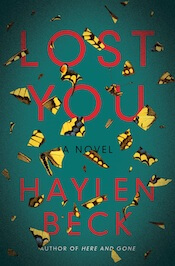
Libby, a newly successful author, takes her young son, Ethan, on a dream vacation to a seven-swimming-pool-strong Florida resort, in Lost You by Haylen Beck (Crown). After struggling with her marriage and tolerating a tepid professional career, Libby figures she deserves nothing less. When she and Ethan cross paths with a jovial couple, Gerry and Charles, the stage is set for a relaxing and semi-indulgent break. Until, that is, Ethan runs into an elevator alone – and then promptly disappears. But this is no mere missing-person mystery: as the resort goes into lockdown with all that situation’s attendant chaos, another story rears its sly, riveting, and thrilling shape. Beck, the pseudonym of the excellent and prolific Stuart Neville, spins a compelling tale with terrific characters, a suspense-riddled narrative, and twists galore. And, on the lighter side of literary delights, there’s a cheeky little cameo of Neville’s debut novel, The Twelve, and a cheerful shout-out in the dedication to his Fun Lovin’ Crime Writers bandmates Chris Brookmyre, Doug Johnstone, Luca Veste, Mark Billingham, and Val McDermid.
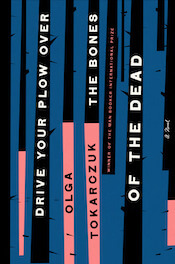
In a deeply rural village in Poland, not far from the Czech Republic border, Janina, an older woman beset by various ailments, pursues astrological divinations, looks after her wealthier neighbors’ houses, and assists her best friend, Dizzy, in his translations of William Blake’s poetry. She also has a distinct tendency to assign people nicknames – Big Foot, Oddball, Father Rustle and the like, spikey anointments rather than cute endearments – and prefers animals to people. When the village and its surrounds begin to have a bit of a human corpse problem, Janina thinks she knows exactly what is going on. In between tangling with the police, dallying with an attractive entomologist, and observing the most pain-by-osmosis dentist session ever, Janina – a former bridge engineer and teacher – inhabits a kind of gothic, feminist fairy tale brimming with social and renegade justice. Olga Tokarczuk’s Drive Your Plow Over the Bones of the Dead (Riverhead; translated by Antonia Lloyd-Jones), is – by multiple, head-spinning turns – alarming, terrifying, thought-provoking, and very, very funny.
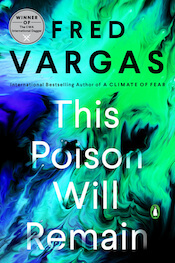
In Fred Vargas’ This Poison Will Remain (Penguin), Inspector Jean-Baptiste Adamsberg returns to Paris from an Icelandic sojourn in order to investigate a brutal hit-and-run incident. But even before that particular crime is laid to rest, a new mystery rears its toxic head: it appears that several older men have been succumbing to the venomous bites of the recluse spider. Hercule Poirot had his little grey cells to assist him; Adamsberg has bubbles – “proto-thoughts” – bouncing around his brain that demand his attention and often pop into eye-opening revelations. When the spider-bite mystery is tied to a sadistic former gang of orphans and a critical piece of Adamsberg’s own history emerges full-force from deep within his unconsciousness, the stage is set for a meticulously spun tale that incorporates history, wordplay, and the darkest of human frailties and failures. Meanwhile, Adamsberg – no slouch when it comes to the pastoral care of his team – manages to keep more than one investigative ball aloft as he also tends to the personal and professional needs of his colleagues.
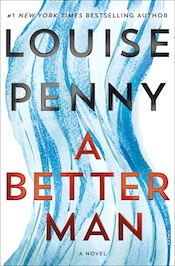
Also returning after a bit of leave time as well as a demotion, Armand Gamache has his hands full: flood waters are rising catastrophically across Quebec, and, unrelatedly, a young woman – a colleague’s friend, in fact – has gone missing. The woman’s husband, an aspiring potter, doesn’t appear to be perturbed by his wife’s disappearance, claiming that she was having an affair; her father, on the other hand, is out for blood. In the cosy – but now very damp – village of Three Pines, Gamache’s friend and artist Clara is trying to cope with an assault on her latest artistic endeavors, while Gamache and his wife, Reine-Marie, receive welcome family news on the eve of their daughter’s relocation to Paris. An intricate thriller that is also intractably infused with the vagaries of familial relationships, professional conundrums, and the vulnerabilities underlying emotionally charged decisions, Louise Penny’s A Better Man (Minotaur), delivers another pleasurably readable chapter in her Chief Inspector Gamache series.
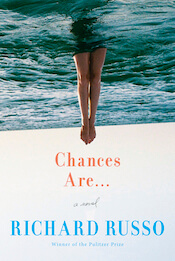
The mystery at the heart of Chances Are… (Knopf) is not the only compelling element in Richard Russo’s latest novel nor its primary driving force: that, I would argue, lies in the characters and intertwined lives of its protagonist-trio, Lincoln, Teddy, and Micky. But the mystery – what happened to Jacy, the woman they were all in love with more than four decades ago – is certainly a large part of what drives them. When the three men, now 66-years-old, gather for a weekend on Martha’s Vineyard – from whence Jacy disappeared after a final, post-graduation hurrah with her friends – the scene is set for reminiscing as well as a spot of sleuthing. Russo’s gimlet-eyed observations of small-community living — whether that might be the year-round realities of a tourist-island town, or the stoic secrets hidden within a wealthy Connecticut enclave — shine through this mystery of a missing-person cold case. But Chances Are… addresses the realities of another kind of criminal venture as well: with this tale of three college buddies who bonded in the 1960s, Russo limns a highly evocative part of America’s soul, the Vietnam War. From a tension-filled draft scene – the so-called “lottery” was televised — to heartfelt conversations between Micky and his father, the overall consequences remain palpable: in war no one wins, particularly not the impossibly young soldiers shipped off overseas to kill other humans.
The Quintessential Interview: Rob Hart
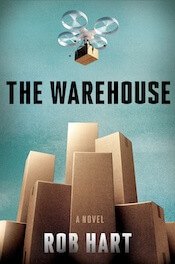
Creepy as all get-out is what The Warehouse is. This new standalone novel by Rob Hart, author of the rough-and-ready PI Ash McKenna series, merges Amazon- and Walmart-like business models into one massive business-and-residence behemoth known as Cloud. Then, Hart juggernauts that concept into its chilling yet logical conclusion: it has everything to do with merging your entire life into your job, very much to the detriment of all our hard-won workers’ rights. Two new recruits, Paxton and Zinnia, join a powerfully air-conditioned Cloud live-work facility; while they find some relief from the climate-change-transformed American landscape, they also find themselves caught in a dystopian, highly recognizable nightmare. Already optioned by Imagine Entertainment for a Ron-Howard-helmed film, The Warehouse shimmers with visual life: elements of 1984, Fahrenheit 451, Ursula K. Le Guin’s “The Ones Who Walk Away from Omelas,” and Jeremy Bentham’s panopticon supply this novel with its muses and precedents, but the narrative voice is all Hart.
What or who are your top five writing inspirations?
Tom Spanbauer's books. My daughter, who makes me want to provide for her, but also imagine a better world. The world itself – most of my story ideas come from getting really frustrated while reading the news. The amazing writing community I'm lucky to be a part of – all those conferences and bookstore signings and writing hangouts do well to recharge the creative batteries. Lately: The BBC show Fleabag, which raised the bar on writing deeply human stories so high, that I need to step up my game.
Top five places to write?
My home office. When traveling: planes, airports, and hotels. Occasionally some friends and I will rent a cabin in the woods and spend a weekend writing (our Broke Hack Mountain retreats). I always prefer my office, as I dislike writing in public –some people are into exhibitionism, and that's fine, it's just not for me. But I do find that I'm incredibly productive while traveling, mostly because there's not much else to do. Stick me on a long flight or in a quiet corner of an airport, and I can do some serious damage.
Top five favorite authors?
Tom Spanbauer — In the City of Shy Hunters is my favorite book. Amy Hempel — no one writes short stories like she does. Ray Bradbury — Fahrenheit 451 made me realize what books could do. Lidia Yuknavitch — she writes with a beauty that is staggering. Chuck Palahniuk — his work was formative for me.
Top five tunes to write to?
I prefer albums over specific tunes, and songs that are light on lyrics and high on atmosphere. So: A Moment Apart by Odesza, Ghosts I-IV by Nine Inch Nails, Bach's cello suites by Yo-Yo Ma, or just a chill piano or strings station on Apple Music. Unless I'm writing a fight scene or action scene, then I do have a specific tune: “Name of the Game” by The Crystal Method, loud and on repeat, until I am finished.
Top five hometown spots?
Mamoun's Falafel on MacDougal – best quick-and-cheap eats in the city. Milon on First between 5th and 6th – best Indian food I've ever had; just make sure to go into the right one. Denino's Pizzeria on Staten Island – there is literally no better pizza than this. But L&B Spumoni Gardens in Brooklyn is a close second, just make sure to get the square slice. And my favorite dessert spot is Big Gay Ice Cream. I didn't intend for this to be nothing but food recommendations, but it just shows you where my head is at.